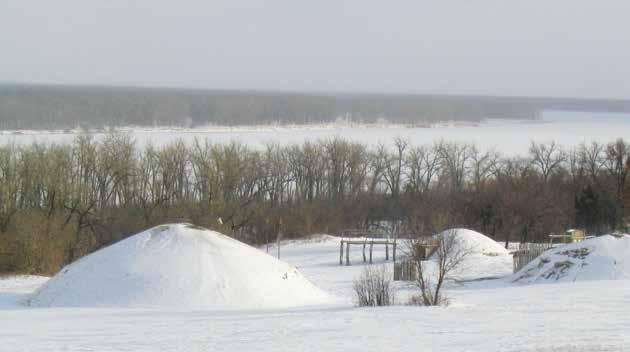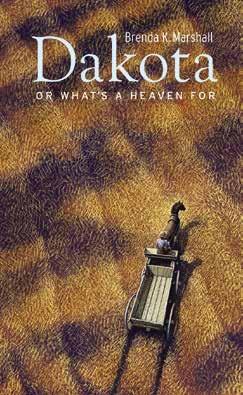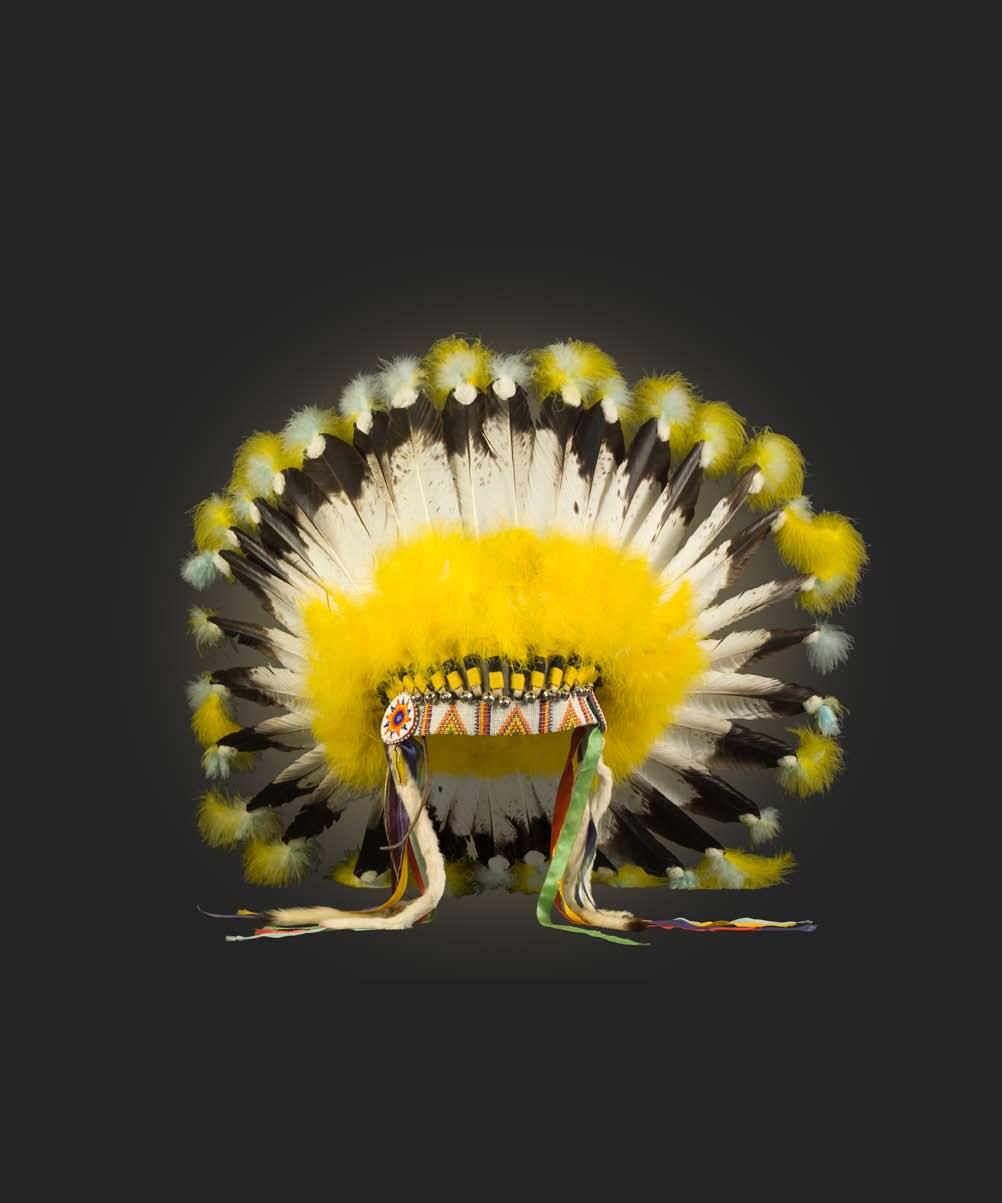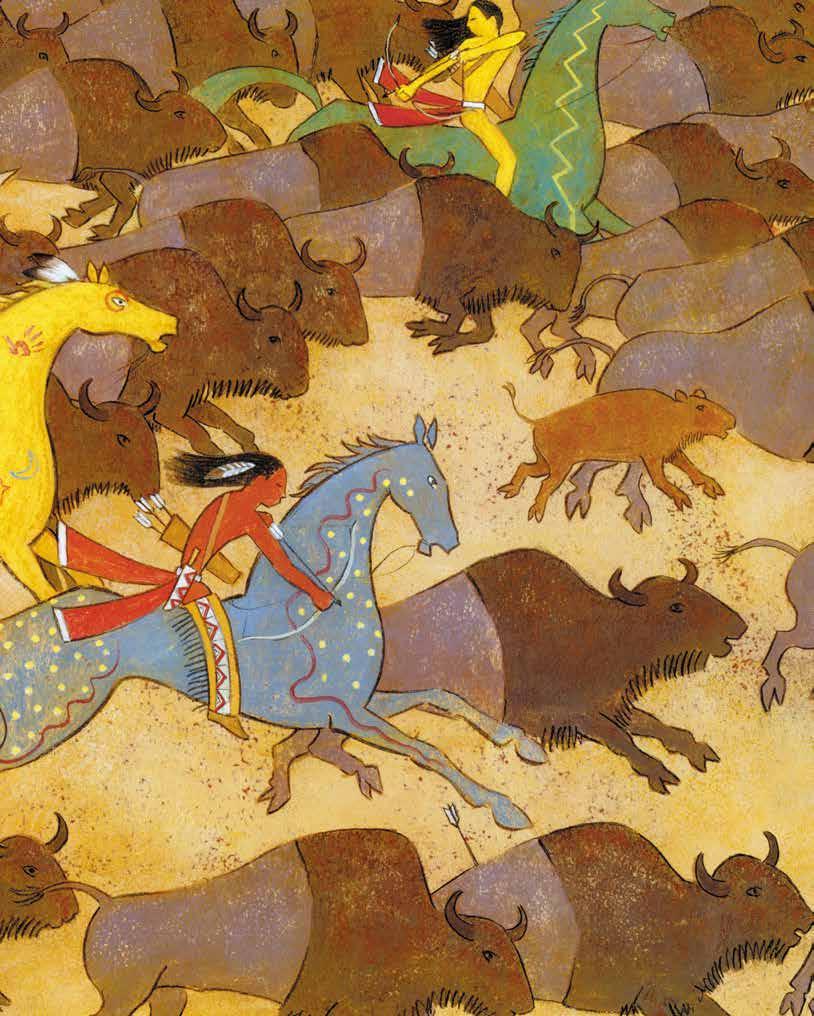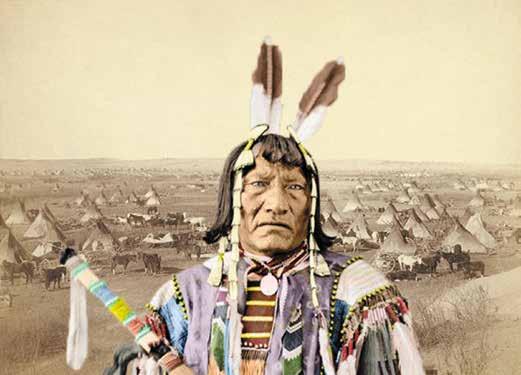
8 minute read
Josephine Gates Kelly: A Granddaughter’s Postscript
Josephine Gates Kelly. National Congress of American Indians conference, Denver, 1948.
(Beaded satchel made by her mother as a graduation present.)
Advertisement
My mother writes a tribute to her own mother, Josephine Gates Kelly, in the third person. She does not use the voice of “I,” she never says, “my mother,” as I do here, to claim Josephine for herself. I ask myself, “Why?” My mother feels close to her mother who has been gone for thirty-four years. When she is ill or troubled, she sits in a rocking chair and covers herself in Josephine’s quilt, as if this worn cotton around her shoulders is the embrace of a mother’s arms. She doesn’t look to her mother for comfort so much as guidance, since my mother was always the dependable one in the family, the girl who didn’t cause trouble or bring her mother any worries. Even now she tries to leave Josephine’s spirit in peace. So why does she tell her mother’s story from a distance?
By Susan Power
I think I understand. We are descended from Chief Two Bear (Mahto Nuhpa), who was a respected council chief during the time of the Civil War. A Dakota chief does not belong to his family, even his beloved children. He belongs to the people. He is available to them when they have troubles they can’t solve on their own, he is responsible for their well being and survival. He gives the first share of all he has to them, and then what remains will be given to his nearest relatives. Growing up in the 1960s I didn’t see examples of this kind of chief on television, in films, or in the many books I devoured. Indian chiefs were inarticulate and bossy, speaking to their people like underlings, telling them what to do. They enjoyed the taste of their power. This didn’t fit the stories I’d been told of my great-great-grandfather, Two Bear, remembrances of his wisdom, foresight, generosity, patience, and courage; his determination to lead his people through treacherous times of enormous change, to ensure their survival, and the survival of generations to come, to ensure that someday a granddaughter like me would be able to write you as I am writing now. His descendants have been raised to understand that they come from a long line of hereditary chiefs of the Yanktonai Dakota, and this means that in some ways their life is not their own, they must find a way to be of service to the people. Josephine became a tribal leader, following in her grandfather’s footsteps, and so her children had to share her with the community and learn to be independent at a young age so she was free to discharge her many obligations. They could not claim her for their own no matter how much she loved them.
I understand, too, my mother’s reluctance to tell our story, to hold up Two Bear and Josephine Gates Kelly as examples. We aren’t meant to brag or nab the spotlight. When journalists wanted to interview Josephine and shine the light on her many accomplishments, she would praise the talents of others and continue to work behind the scenes, deflecting attention from herself. She wasn’t seeking praise or even gratitude—she was simply doing what she was supposed to. And yet the time has come to tell her story because we don’t have as many good examples as we once did. So many tribal governments have been remade in the likeness of the mainstream American system due to the Indian Reorganization Act, that we sometimes emulate what we see in Washington—we learn to love our power, accumulate treasure, and help our families before anyone else. We learn to tell people what they want to hear, and then leave the difficult choices for someone else to make.
In the 1930s when the Standing Rock Sioux Reservation was suffering through the Depression and the flying dirt of the Dust Bowl years, the tribal council had a little money they spent on a few lean buffalo. The buffalo were killed and the meat butchered in Josephine’s yard. Her children were hungry, like everyone else, and they were thrilled to hear of this rare treat, anticipating what section of the animal they would be given, already tasting its nourishing juices. They watched closely as council members carved the precious meat, placing it in tubs the people brought with them to carry the food home. Josephine went about her work while her children hopped excitedly in the yard, waiting for their share. Soon they became nervous, would there be anything left by the time the tribal council was done sharing out the food? They whispered to their mother, and she hushed them, saying, “The chief’s family eats last.” In the end they did receive a small piece of buffalo meat, the plank, what remained after everyone else had been fed. As children they were disappointed, but as adults, they appreciated their mother’s consistency, how she never placed herself above the needs of her people. We live in a time where many of our leaders worry that when they move to Washington they’ll be trapped in a “bubble,” they will forget what it is to be one of the people, one of their constituents. If they followed the old-time ways of Dakota leaders they would not accept health care for their families until they knew their people could afford doctors, they wouldn’t accept high salaries until they knew their people had work and could support themselves. So my mother sits down to write a few pages about her mother, Josephine, even though Grandma wouldn’t want the attention—as a reminder of what is possible.
My mother raised me to honor these traditional values even as I ventured into the mainstream and spent many years being educated in the Academy. When I set off for college she told me not to
forget the people I came from, my courageous, generous ancestors, and I find myself coming back to this foundation again and again. I was taught that human life is not more important than the lives of other beings, that we have debts to one another as relatives on this planet. She told me how when she was a girl, spending the day outdoors with her brothers and sisters, scrounging to find edible roots, berries, they sometimes came across a cache of beans collected by field mice. The first time they made this triumphant find, they ran home with the treasure, expecting their mother to be so happy! Instead, she quizzed them to find out how they’d come by this bounty, and when they told her, she scolded them for stealing from the mice. She gave them corn to take back in place of the beans so the mice would have something in return. They obeyed her, probably grumbling a little along the way. It isn’t easy to live so carefully, acknowledging our responsibilities to so many beings. Yet these are the values that come back to me now as the worthiest lessons of my life, as so many other theories and principles fall away.
My grandmother, Josephine, never scolded me—I could always count on her to take my side. Yet I can imagine her spirit scolding me now, reminding me that we are all just unsika (pitiful) people doing the best we can. “Don’t make me a saint,” she admonishes. “No one is perfect.” I feel she will always be uncomfortable with the spotlight aimed in her direction, but I share my mother’s instinct to tell at least a small piece of her story for we are once again living in challenging times of enormous change. Are we really doing the best we can? I will never be the leader my grandmother was, yet holding her example before me I will surely be a better person for her inspiration.
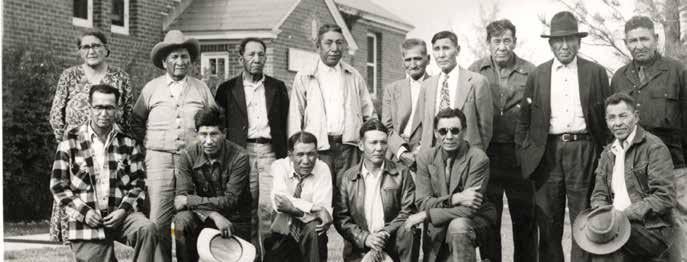
I have been so fortunate to travel the world and study with gifted teachers, curious about the histories of people of all different backgrounds. Reading the work of prophets and philosophers writing out of very different traditions has enriched my life, expanded my brain. But I reject the role of the marginal person, the empty vessel needing to be filled by others, as if teaching is a one-way road. I don’t come from a subculture, a dangling branch that hangs off the proud American tree. Our tribal roots drill deep and have yet to be plucked from this territory, this Turtle Island continent. We know how to live in this place so that life is possible from one generation to the other, all varieties of life are sustained. Tribal peoples have been schooled by the mainstream for hundreds of years, and a few of us are beginning to turn the tables and step forward with our stories, our own lessons, which we offer up as necessary additions to the Canon.
Josephine (pictured top left.), Chairman of the Standing Rock Sioux Tribe, Fort Yates, N.D., 1944. (With her Tribal Council.)
It is time for us to do some teaching.
Susan Power is the author of The Grass Dancer, Roofwalker, and a forthcoming novel, Our Lady of the New World. She is an enrolled member of the Standing Rock Sioux tribe, born and raised in Chicago, and a graduate of Harvard Law School and the Iowa Writers’ Workshop. She currently lives in Saint Paul, Minnesota. In the Dakota tradition, Susan carries the name Wanahca Wastewin, Good Flower Woman, in honor of her maternal grandmother.


